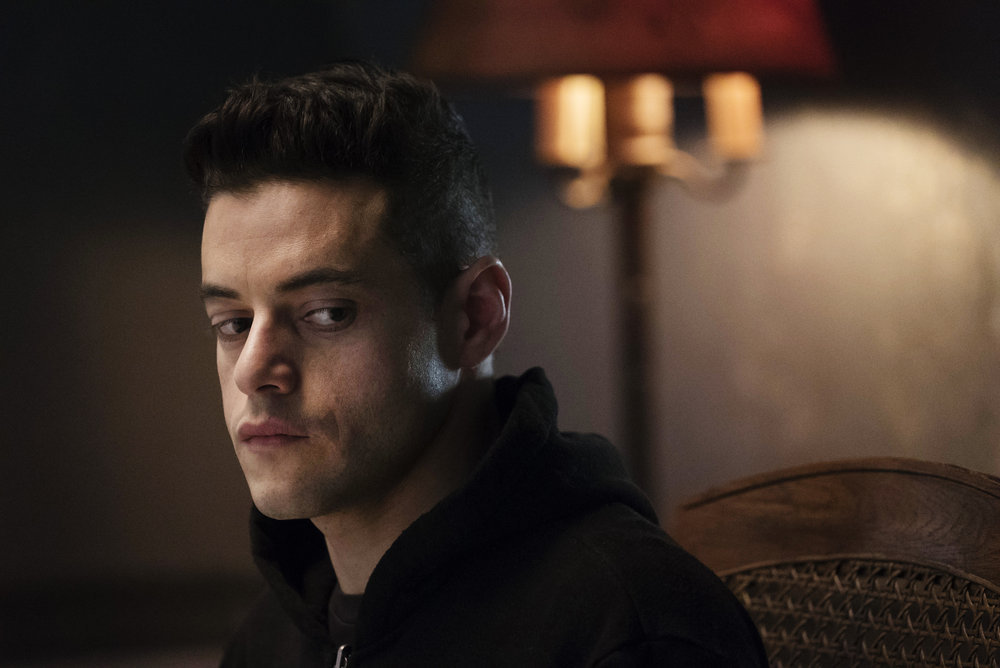USA’s “Mr. Robot” is one of those rare programs that has
literally redefined the network on which it airs. Much as “Mad Men” did with
AMC and “The Sopranos” did with HBO, Sam Esmail’s show has ushered out the
sunny skies of shows like “Royal Pains” in favor of the cynical, stylish vision
of their most critically acclaimed hit. With success comes backlash, and I’ve
seen a lot of “it’s not that good”
posts about “Mr. Robot” of late, especially in the days leading up to its
second season. Like so many entertainment products in our instant-opinion
world, it seems that you have to love or hate “Mr. Robot.” Personally, I found
the first the season fascinating, especially regarding its style and
performances, but the writing often wallowed in its own cleverness, more eager
to impress than express. And yet it feels like a show that could really figure
out what it was going to accomplish in season two, which premieres this
Wednesday night. In its two-part, two-hour premiere, some problems from season one resurface, but, for the most part, this is entertaining,
accomplished television that has to something to say. I would
even go as far as to say “Mr. Robot” is one of the most important shows on
television, showing creators that a different visual language and storytelling
style is possible in the era of the antihero.
(Note: If you’ve delayed catching up on season one of the show, this is where the spoilers kick in. No spoilers beyond the basics for season two.)

“Mr. Robot” is about the artificiality and cynicism of an
increasingly tech-driven world, which should make for a show that feels cold
and calculated, but that aspect is offset by the emotional, fragile, brilliant performance from
Rami Malek as Elliot. Learning the depths of his mental illness extended to a
split personality that created a character based on his own father named Mr. Robot (Christian Slater), who operated as the head of the hacker group fsociety but was really Elliot all
along, our poor young man has entirely disconnected at the start of season one.
It’s like if Jack from “Fight Club” had to learn how to live with Tyler Durden. Knowing Mr. Robot’s
tendency to world destruction when he’s near a computer, Elliot is living an
analog life, going through a routine every day that includes diners,
handwritten notebooks and a local basketball game. He’s totally logged off. And Mr. Robot is pissed.
Meanwhile, the government pressure over the 5/9 hack by
fsociety that essentially toppled the banking system is increasing. Everyone is
still looking for Tyrell Wellick (Martin Wallström), one of the fall guys for
the hack, while the writers cleverly use real footage of people like Leon
Panetta talking about hacks to enhance the reality of their story. Those of you
wondering where Tyrell went at the end of last season will get some immediate
answers, but his long-term role in the season is still a bit hazy. Instead, we
catch up with a still-determined Darlene (Carly Chaikin), an Angela (Portia
Doubleday) who has retreated to the warm arms of Evil Corp., and are introduced to new characters played by Grace Gummer and Craig Robinson, two welcome
additions to the cast.
One of the reasons that “Mr. Robot” can get away with its
overwriting on occasion is because we’re often hearing the narration/thoughts
of the troubled Elliot, who now cleverly breaks the fourth wall and
admits to not trusting us as much because we withheld things from him, as
viewers, last year. So when Elliot says things like how he enjoys the “invisible
code of chaos hiding behind the menacing face of order” when he describes a
pick-up basketball game, it may sound ridiculously overwritten, but it also
fits with Malek’s portrayal of this character, as does the often
overly-stylized look of the show. Many of the cries of “overrated” when
it comes to “Mr. Robot” come down to being unwilling to accept the show as an expression of
its characters’ damaged psyches.
Because of that reason, the show can often be as annoying as
Elliot. It too often takes stabs at the people who need their “NCISes and
Lexapro,” and for every scene in which I love the unusual pace of “Mr. Robot,”
there’s another where it feels indulgent (especially in the second half of this
premiere). And yet we need to embrace programs that display a visual language
this strong, even if it sometimes does so to excess. Esmail and his team love
negative space and static shots, often bringing people just into a quarter of
the frame, allowing the world around them to feel gigantic and oppressive. In
the end, that’s why “Mr. Robot” has struck a chord. We’re in an increasingly
terrifying age, defined in no small part by our reliance on technology and
crushing societal debt. No matter what you think of its indulgence, “Mr. Robot”
has something to say about the issues of today. And we need more television
that tries to do so.













